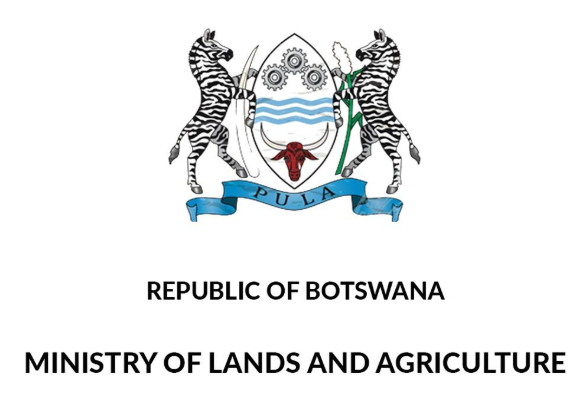
Ministry of Lands and Agriculture
The broad function of the Ministry is to improve food security and champion agricultural development through local production, reduction of import bill, diversification of the sector, value addition, employment, promotion of consumption of local foodstuff, as well as establishment of agricultural based poverty eradication projects. The ministry implements its mandate through six departments and one division.
- Department of Animal Production
- Department of Crop Production
- Department of Agribusiness Promotion
- Department of Veterinary Services
- Department of Agricultural Research, Statistics and Policy Development
- Department of Corporate Services
- Department of Agricultural Research
- Division of Agricultural Information and Public Relations
Ministry Parastatals
- Botswana University of Agriculture and Natural Resources (BUAN)
- Botswana Meat Commission (BMC)
- National Food Technology Research Centre (NFTRC)
- Botswana Agricultural Marketing Board (BAMB)
- Botswana Vaccine Institute (BVI)
- National Agricultural Research and Development Institution (NARDI) [being established]
Department of Animal Production (DAP)
- To make the livestock sub-sector competitive and reduce the country’s reliance on imports of livestock products that can be viably produced in the country.
- To transfer skills and technologies on the various animal science disciplines to make livestock production attractive and profitable to farmers, thus creating employment opportunities, increasing rural incomes and reducing rural urban migration.
- It provides expert advice to livestock farmers on livestock improvement and product development in terms of breeding, nutrition, housing, processing and optimal use of rangelands.
- It also assists subsistence farmers to transform their operations to commercial levels, as well as, enabling commercial farmers to upgrade their level of management and technology application.
Department of Crop Production (DCP)
- To make arable sub-sector competitive and reduce the country’s reliance on imports through assisting farmers to upgrade their level of management and technology application.
- It controls pests of national importance and provides an advisory role on matters relating to agricultural resource conservation.
Department of Agribusiness Promotion (DABP)
- To promote a commercialized, diversified, sustainable and competitive agricultural sector through business skills transfer, promotion of agricultural cooperatives and associations, market access negotiations, investment promotion and promotion of market led production.
Department of Veterinary Services (DVS)
- Provides animal and public health services to achieve sustainable and competitive livestock industry through prevention and control of nationally and economically important animal diseases.
Department of Agricultural Research, Statistics and Policy Development (DARSPD)
- Coordinates policy research and development.
- It undertakes monitoring and evaluation of agricultural programmes
- It also provides statistical information services towards a competitive and sustainable agricultural sector, as well as, attainment of food security.
Department of Corporate Services (DCS)
- Coordinates resources, and provides administrative, corporate communication and other support services to other Ministry departments to enable them to deliver on their mandates
Department of Agricultural Research (DAR)
- Generate through research, improved crop and livestock production technologies to promote the development of a productive and enviroment friendly agriculural sector
- The department also provide supportive services and technical advice to the farming community
Division of Agricultural Information and Public Relations (DAIPR)
- Coordinates the public relations function of the Ministry.
- It is also responsible for the dissemination of agricultural information and development of teaching aids.
Ministry Parastatals and key functions
Botswana University of Agriculture and Natural Resources (BUAN)
- It is mandated to provide education and training in the science and practice of agriculture and other allied and related subjects.
- The University is also responsible for generating sustainable technologies through research and provides advisory services to farmers and other stakeholders to improve agricultural productivity.
Botswana Meat Commission (BMC)
- It is mandated to purchase and slaughter livestock, process and sell meat and other animal products to promote the interests of the livestock industry.
National Food Technology Research Centre (NFTRC)
- It is mandated to promote the development of the food industry in Botswana through research and development of food products and processes using indigenous raw materials,
- provision of food quality testing to ensure food safety standards and nutritional adequacy, commercialization of local food products and provision of related technical assistance to the food and agricultural industry.
Botswana Agricultural Marketing Board (BAMB)
- It provides a market for all locally grown scheduled crops such as cereals, pulses (beans) and oils seeds whilst ensuring that adequate supplies exist for sale to customers at affordable prices.
- It acts as a one stop agricultural service centre to the farming community and general public.
Botswana Vaccine Institute (BVI)
- Its mandate is to support the livestock industry by conducting research and manufacturing of all kinds of vaccines for sale throughout the world.
National Agricultural Research and Development Institution (NARDI) [being established]
- As a key research institute, the organization will be responsible for development of the country’s research agenda and generating improved crop and livestock production technologies to enhance the development of a productive and environmentally friendly agricultural sector.


